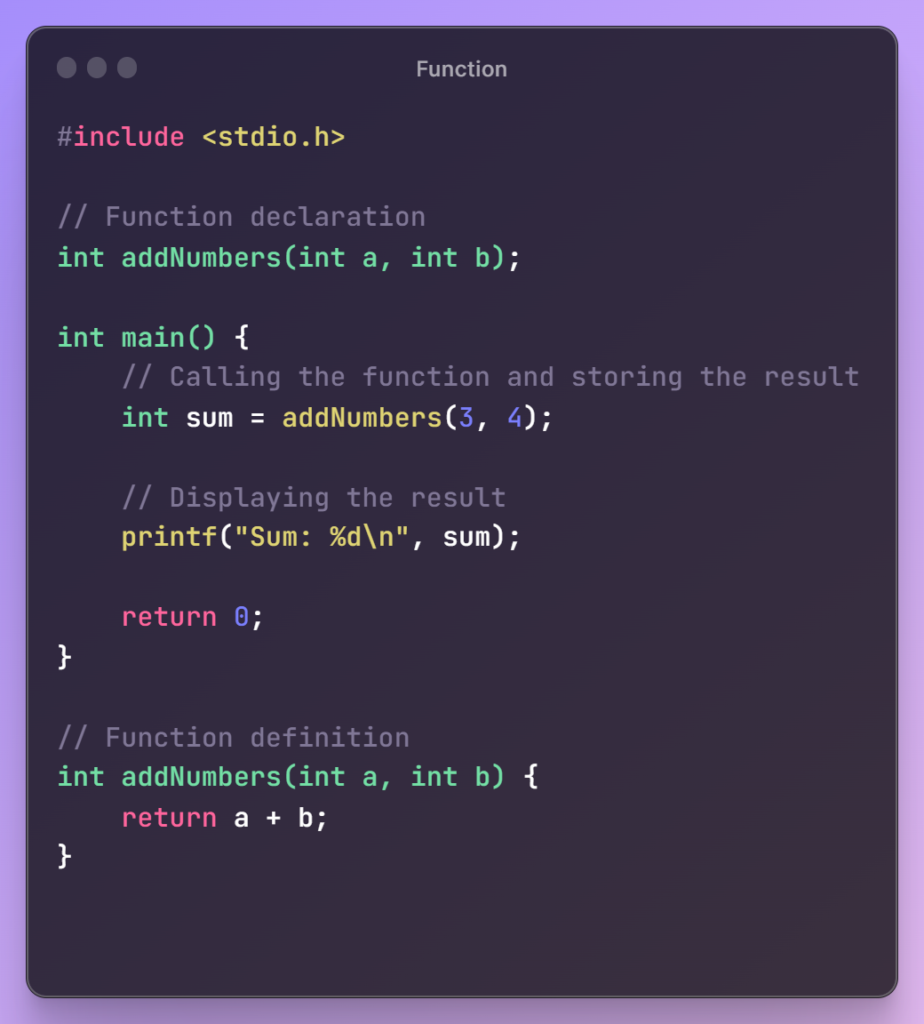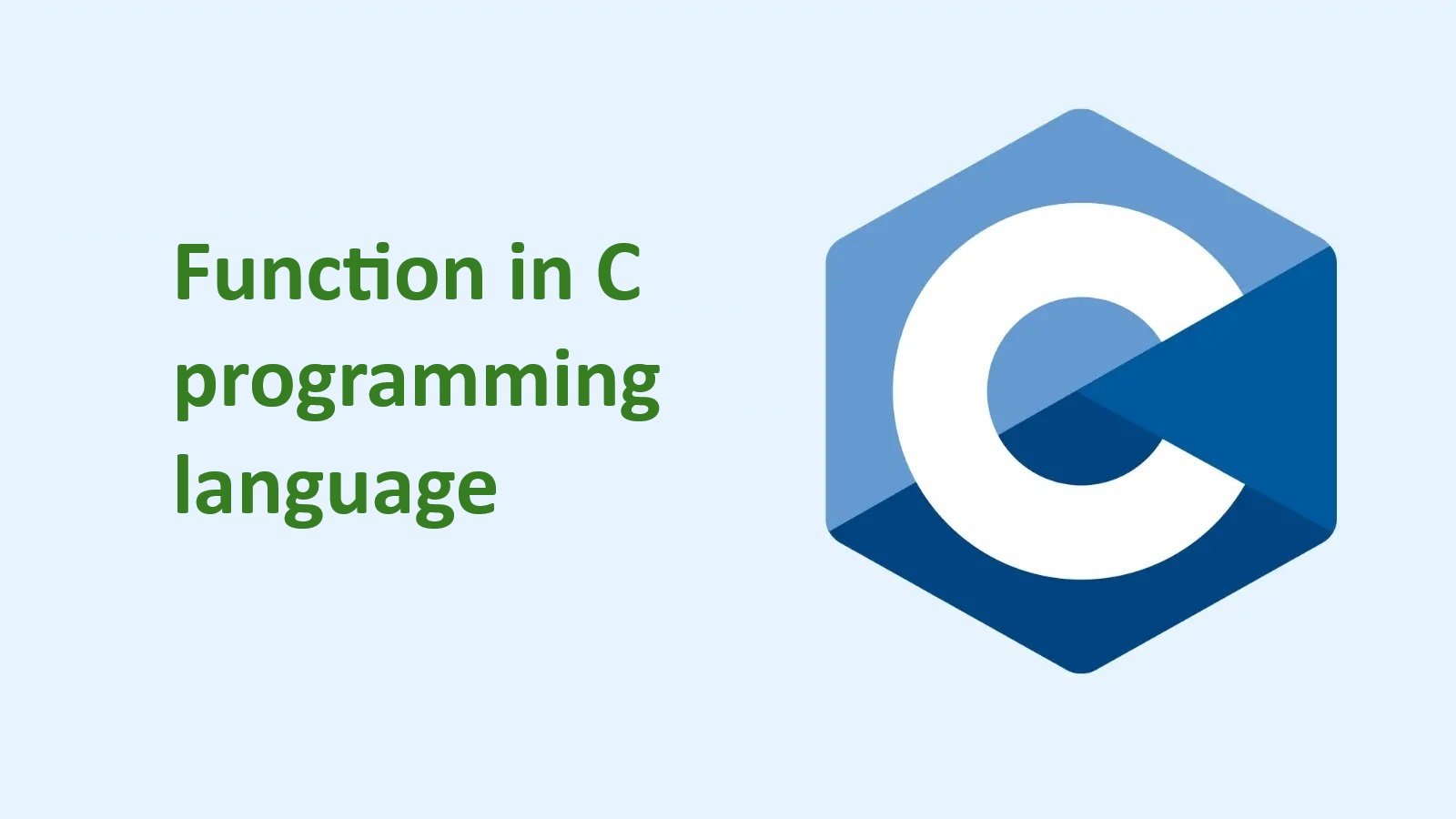Functions in C programming language
A complex problem may be decomposed into a small or easily manageable parts or modules called functions. Functions are very useful to read, write, debug and modify complex programs. They can also be easily incorporated in the main program. In C++, the main() itself is a function that means the main function is invoking the other functions to perform various tasks.
The main advantages of using a Functions in C programming language are:
- easy to write a correct small function
- easy to read, write and debug a function
- easier to maintain or modify such a function
- small functions tend to be self documenting and highly readable
- it can be called any number of times in any place with different parameters
Most of the high level languages such as BASIC, FORTRAN or Pascal allow both subroutines or procedures and functions. In these languages, the formal arguments may be passed and returned only by the subroutines or procedures. The functions may take some formal arguments and can only return one value and then only through the function name itself.
In C/C++, there is no difference between a function and subroutine. The functions may or may not take some formal arguments for calling a portion of the program. The function may or may not transfer back, values to a called function block. It may behave like a traditional subroutine or as a function or as both. Secondly, most high level languages differentiate between a main program and subprograms. In C/C++, all modules are called functions and they all have the same structure.
Defining A Function
A function definition has a name, a parentheses pair containing zero or more parameters and a body for each parameter, there should be a corresponding declaration that occurs before the body. Any parameter not declared is taken to be an int by default. It is good programming practice to declare all parameters.
Recent compilers such as ANSI C may permit including the argument declaration within the parentheses:
In the C programming language, functions are a fundamental building block that allows developers to organize code into modular and reusable units. A function in C consists of a set of statements that perform a specific task, and it can be called or invoked from other parts of the program. Functions serve several key purposes:
Modularity:
- Functions enable modular programming by breaking down the program into smaller, self-contained units. Each function is responsible for a specific task, making the code more readable and maintainable.
Reusability:
- Once defined, a function can be reused in different parts of the program or even in other programs. This reusability minimizes code duplication and promotes a more efficient development process.
Readability:
- Functions improve code readability by abstracting away implementation details. Instead of including all the code for a specific task in one place, functions encapsulate that logic, providing a high-level view of the program’s structure.
Parameter Passing:
- Functions can accept parameters (inputs) to perform their tasks. Parameters allow functions to work with different data values each time they are called.
Return Values:
- Functions can return a value to the calling code, allowing them to communicate results or computed values.
Library Functions:
- C provides a set of standard library functions, and developers can create their own libraries of functions. These libraries can be shared across projects or with other developers.
The general format of the function definitions is given below.
function type function name (datatype argument 1, datatype argument 2…)
{
body of function
_________________
_________________
return something
}
-
Declaring the type of a function:
The function refers to the type of value it would return to the calling portion of the program. Any of the basic data types such as int, float, char etc, may appear in the function declaration. In many compilers, when a function is not supposed to return any value, it may be declared as type void, which informs the compiler not to save any temporary space for a value to be sent back to the calling program.
For example:
void function name (…)
int function_name (…)
float function name (…)
char function name (….)
-
Function name:
The function name can be any name conforming to the syntax rules of the variables. Normally, a function name is made relevant to the function operation, as it will be easy to keep a track of it, whenever a transfer of similar functions is used in the main program.
For example:
counter ();
square ();
display_value ();
output ();
-
Formal arguments:
Any variable declared in the body of a function is said to be local to that function. Other variables which are not declared either as arguments or in the function body, are considered “global” to the function and must be defined externally. The storage classes or scope of variables are discussed subsequently in this chapter.
For example:
void square (int a, int by)
// a, b are the formal arguments
{
________
________
}
-
Function body:
After declaring the type of a function, function name and formal arguments, a statement or a block of statements is enclosed between the beginning and the end statements. In C/C++, each function is declared almost like a main() function.
For example:
void all_add (int a, int b, int c, float x, float y)
{
int i,j,n; // local variables, if any
_________
_________
_________
}
Functions are declared with a signature, which includes the return type, function name, and parameter list (if any). The function’s actual implementation follows the declaration. Functions need to be declared before they are used, either by placing their full definition above the calling code or by providing a function prototype.
Here’s an example that demonstrates a Functions in C programming language :



2 thoughts on “Functions in C programming language”
Comments are closed.